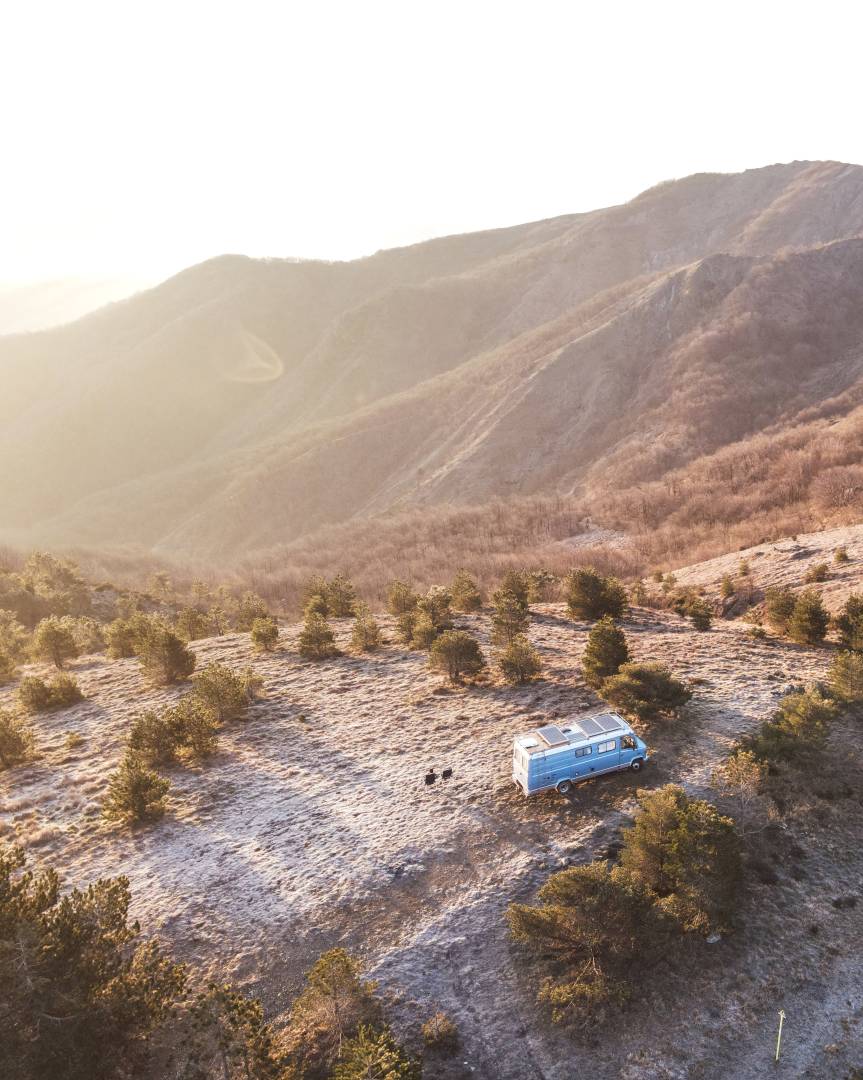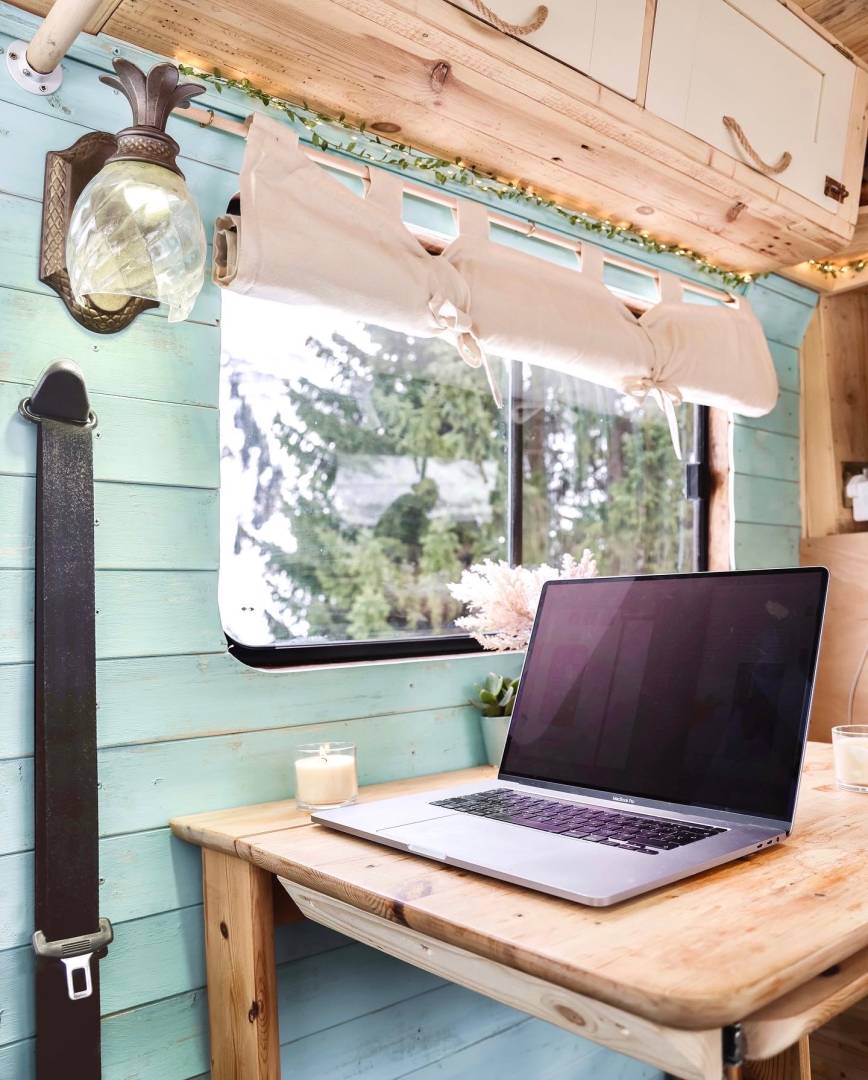On the road Campervan tips from real-life digital nomads: ‘Maui & Us’ (Part 2)
We are continuing on from our chat with Charlotte and Nico, owners of Maui, their Mercedes Vivaro. They have been travelling for the past 6 months across Europe, and we caught up with them to get their top tips for anyone considering switching their 9-5 for life on the road!
Find Caravan Storage
Browse caravan storage for rent
Find Caravan Storage
To recap briefly – Charlotte and Nico spent 2 years renovating Maui by themselves and now balance working on the road with overcoming the challenges of maintaining a big Campervan like Maui. In part 2, they give their top tips for the Schengen Zone – a must-know for UK travellers in Europe, finding a parking spot, cooking on the road and working productively while on the road!
If you missed part 1 of our chat, where we discussed everything you need to know before getting on the road – from choosing a van to renovation tips, check it out at this link below. Also – don't forget to check out their Instagram page where there are helpful videos and amazing photos of their adventures: @Mauiandus
Related
Campervan Rennovation tips from Real-life digital nomads: ‘Maui & Us’ (Part 1)
Exploring the Schengen Zone: Tips for UK Travellers
The Schengen Zone, a collection of 27 European countries, is a popular destination for travellers seeking rich history, diverse cultures, and beautiful landscapes. However, as a UK traveller, there are certain factors you should consider when planning your trip to the Schengen Zone, particularly in terms of visa requirements. For full information about the Schengen Zone and Schengen Visa, see the website (https://www.schengenvisainfo.com/).
What is the Schengen Zone?
The Schengen Zone comprises 27 European countries that have abolished passport and border control at their mutual borders. This agreement allows for passport-free movement within the zone, making travel between these countries seamless and convenient. The member countries include Austria, Belgium, Croatia, Czech Republic, Denmark, Estonia, Finland, France, Germany, Greece, Hungary, Iceland, Italy, Latvia, Liechtenstein, Lithuania, Luxembourg, Malta, Netherlands, Norway, Poland, Portugal, Slovakia, Slovenia, Spain, Sweden, and Switzerland.
Schengen Visa for UK Travellers
Since the UK is not a part of the Schengen Area, British citizens need to be aware of certain travel requirements when visiting the zone. After Brexit, UK travellers are now considered third-country nationals, which means different rules apply to them. Here are some key points to consider:
- Visa-free travel for short stays: British citizens can still travel to the Schengen Zone for short stays of up to 90 days within any 180-day period without needing a visa. This applies to tourism, family visits, and business trips. However, if you plan to stay longer, work, or study, you may need a visa or permit depending on the country and the purpose of your stay.
- Valid passport: Ensure your passport is valid for at least six months from your date of entry into the Schengen Zone. Additionally, your passport must be less than 10 years old on the day you enter the zone.
- Border control checks: Be prepared for possible border control checks when entering the Schengen Area. You may be asked to provide information on your travel plans, accommodation, and proof of sufficient financial means to cover your stay.
- Travel insurance: Although not mandatory, it's highly recommended to have travel insurance that covers medical expenses, repatriation, and emergency assistance. Some countries may ask for proof of insurance upon entry.
- ETIAS (European Travel Information and Authorisation System): Starting from the end of 2022, UK travellers will need to apply for an ETIAS before visiting the Schengen Zone. This online travel authorisation system is designed to strengthen security and streamline the visa process for third-country nationals. The ETIAS will be valid for three years and allow for multiple entries. Keep an eye out for updates on the official implementation date and be prepared to apply for an ETIAS before your trip.
By considering these factors and staying up-to-date on travel requirements, UK travellers can ensure a smooth and enjoyable journey to the Schengen Zone.
Top Tips for Finding the Perfect Parking Spot for Your Camper Van
When you're on the road in your camper van, finding a safe and convenient place to park for the night is essential. Here are our top three tips to help you locate the ideal spot to rest and recharge:

- Utilise the Park4Night app (Link). This handy mobile app helps you find suitable parking locations for your camper van. It provides valuable information, such as safety ratings, available features, and user reviews. The app is suitable for both day trips and longer stays, and even offers photos of each parking spot, allowing you to get a sense of the location before you arrive.
- Plan ahead and take offline maps when travelling abroad. When venturing outside your home country, it's wise to download offline maps and plan potential parking spots in advance. This ensures that you'll always have access to reliable navigation and location information, even if your Internet connection is spotty or unavailable.
- Be sensible, prepared, and considerate when choosing your parking spot. Ask yourself important questions when evaluating a potential parking location, such as: Does it look safe? Can I easily reach a town if necessary? Do I have enough petrol and water? If my camper van breaks down, will I be okay?
- Legality of the parking spot: Make sure that you're allowed to park for free in your chosen location. You don't want to inconvenience or annoy locals.
- Be respectful and mindful of others: Always consider the impact of your presence on the surrounding community and other travellers.
- Leave the area cleaner than you found it: Be responsible and eco-friendly by picking up any litter you've created, and even going the extra mile to remove any additional rubbish you come across.
By following these tips, you'll be well-equipped to find the perfect parking spot for your camper van, ensuring a comfortable and enjoyable journey. Happy travels!
Related
How To Earn By Renting Out Your Driveway For Caravan Storage
Top Tips for Cooking in Your Camper Van
Cooking in a camper van can be a unique and enjoyable experience. However, it's essential to consider your setup and available resources to ensure that meal prep goes smoothly. Here are our top four tips for cooking in your camper van:
- Consider your cooking appliances. The types of meals you can prepare in your camper van will largely depend on the cooking tools you have at your disposal. For example, if you have a hob inside, you'll be able to cook dry foods such as pasta and rice easily throughout the year. If you only have an outside camping stove, this will be harder in winter.
- Evaluate your power source and cooking setup. Whether your van runs on LPG or electricity, it's crucial to know what kind of cooking setup you have. If you're using a camping hob outside, keep in mind that cooking outdoors in winter can be challenging. Plan accordingly to ensure a comfortable and efficient cooking experience.
- Be mindful of refrigerator space. If your camper van has a fridge, think about its size and storage capacity. This will determine the number of perishable food items you can store and how you'll need to plan your meals accordingly - particularly if you are eating meat on the road.
- Accommodate pets when planning meals. If you're travelling with a furry companion, make sure you allocate space for their food in your camper van. This will help keep your pet's food organised and easily accessible while you're on the road!
By taking these tips into account, you'll be well-prepared to cook delicious and satisfying meals in your camper van, no matter where your adventures take you. Bon appétit!
Related
Caravan Cooking: Simple and Delicious Recipes for the Road
Top 5 Tips for Working Productively from Your Camper Van
Working remotely from a camper van can be a dream come true for digital nomads, but it requires careful planning and organisation. Here are our top five tips to help you work effectively and comfortably from your van:

- Research reliable data and Internet solutions. Having a stable Internet connection is crucial for working remotely. Consider options like a 5G router with a monthly subscription, or using local SIM cards for data when travelling to different countries. Some American campers have turned to Starlink for their Internet needs, which costs $60 per month and offers impressive coverage. If you're a content creator, be prepared for higher data usage.
- Establish a routine and structure. When working from your van, it's important to create a routine and set boundaries for work and leisure. Develop a daily schedule that includes designated lunch and working hours to maintain productivity and work-life balance.
- Design a comfortable and efficient workspace. Make sure your camper van includes a pleasant, ergonomic workspace. Consider how often you'll be working and the size of the workspace you'll need. A comfortable and functional environment can greatly improve your productivity.
- Account for working with a partner in close quarters. If you're travelling and working with a partner, take into account the need for personal space and uninterrupted work time. Discuss and plan how to manage working closely together in order to maintain a healthy relationship and work environment.
- Be aware of tax implications based on your travel frequency. Understand the tax requirements for your specific situation, depending on how often you're moving between countries. For example, if you're frequently on the move, you may still need to pay taxes in your home country, like the UK. However, staying in one country for an extended period may require you to adhere to local tax regulations.
By following these tips, you'll be well-prepared to work efficiently and comfortably from your camper van, allowing you to enjoy the freedom and flexibility of the digital nomad lifestyle.
Find Caravan Storage
Browse caravan storage for rent
Find Caravan StorageElliot
Written 18th May 2023
